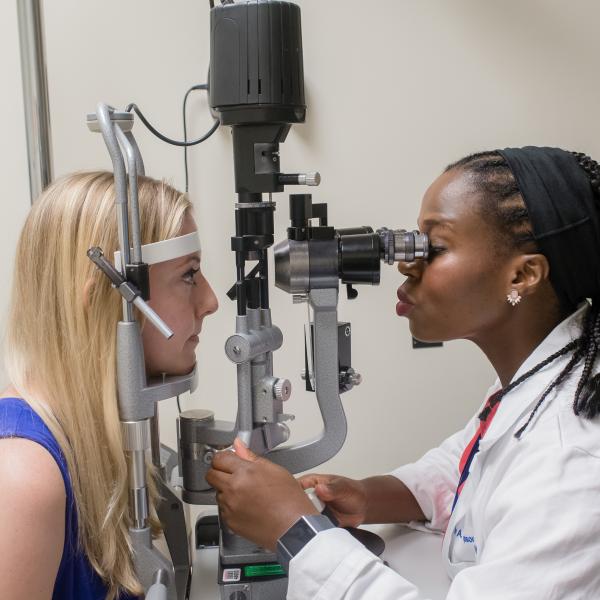Why Can the Retina Pull Away From the Back of the Eyeball

At a glance: Retinal Disengagement
-
Symptoms:
A sudden increase in floaters (small dark spots or squiggly lines that float across your vision), flashes of light in one eye or both optics, a "curtain" or shadow over your field of vision
-
Diagnosis:
Dilated eye exam
-
Treatment:
Laser treatment, surgery
If y'all have symptoms of retinal detachment, become to your eye physician or the emergency room right abroad. Retinal detachment can crusade permanent vision loss — merely getting treatment correct away can help protect your vision.
What is retinal detachment?
Retinal detachment is an eye problem that happens when your retina (a light-sensitive layer of tissue in the dorsum of your eye) is pulled away from its normal position at the back of your eye.
What are the symptoms of retinal disengagement?
If only a small part of your retina has detached, you may non take any symptoms.
Merely if more of your retina is detached, y'all may not exist able to see as clearly as normal, and you may notice other sudden symptoms, including:
- A lot of new floaters (small dark spots or squiggly lines that bladder across your vision)
- Flashes of light in one centre or both eyes
- A dark shadow or "drapery" on the sides or in the center of your field of vision
Retinal detachment is a medical emergency. If you accept symptoms of a discrete retina, it'south important to go to your eye doctor or the emergency room right away.
The symptoms of retinal detachment ofttimes come on quickly. If the retinal detachment isn't treated right away, more than of the retina can detach — which increases the risk of permanent vision loss or blindness.
Am I at risk for retinal detachment?
Anyone tin can have a retinal detachment, but some people are at higher risk. You are at higher risk if:
- You or a family fellow member has had a retinal detachment before
- Yous've had a serious heart injury
- You lot've had eye surgery, similar surgery to treat cataracts
Another bug with your eyes may as well put you lot at higher risk, including:
- Diabetic retinopathy (a status in people with diabetes that affects claret vessels in the retina)
- Extreme nearsightedness (myopia), peculiarly a severe type called degenerative myopia
- Posterior vitreous detachment (when the gel-like fluid in the center of the eye pulls away from the retina)
- Certain other eye diseases, including retinoschisis (when the retina separates into 2 layers) or lattice degeneration (thinning of the retina)
If you're concerned nigh your risk for retinal disengagement, talk with your heart doctor.
What causes retinal disengagement?
There are many causes of retinal detachment, but the most common causes are aging or an center injury.
There are three types of retinal detachment: rhegmatogenous, tractional, and exudative. Each type happens because of a different problem that causes your retina to move away from the back of your eye.
How tin can I prevent retinal detachment?
Since retinal detachment is often caused by crumbling, at that place'south often no way to preclude it. Merely you can lower your risk of retinal detachment from an eye injury past wearing safety goggles or other protective center gear when doing risky activities, like playing sports.
If yous experience any symptoms of retinal disengagement, become to your eye md or the emergency room right away. Early treatment can aid forbid permanent vision loss.
It'southward also of import to get comprehensive dilated centre exams regularly. A dilated center test tin can aid your middle doctor find a small retinal tear or disengagement early, before information technology starts to affect your vision.

Did y'all know?
Retinal detachment tin can happen to anyone
If you have an eye injury or trauma (like something hitting your middle), it's important to come across an eye doctor to check for early signs of retinal detachment
Seeing a few floaters (small dark spots or squiggly lines) in your vision is normal — but if yous of a sudden run across a lot more floaters than usual, it'southward important to get your eyes checked right abroad
How will my eye md bank check for retinal detachment?
If y'all encounter whatever warning signs of a retinal detachment, your eye doctor can check your eyes with a dilated eye exam. Your doctor will requite you some center drops to dilate (widen) your student and then expect at your retina at the back of your heart.
This exam is usually painless. The doctor may press on your eyelids to check for retinal tears, which may be uncomfortable for some people.
If your center doctor still needs more than information subsequently a dilated heart exam, you may get an ultrasound or an optical coherence tomography (OCT) browse of your eye. Both of these tests are painless and can help your eye doctor encounter the verbal position of your retina.
What's the treatment for retinal disengagement?
Depending on how much of your retina is detached and what blazon of retinal detachment you take, your center doctor may recommend laser surgery, freezing treatment, or other types of surgery to fix any tears or breaks in your retina and reattach your retina to the dorsum of your eye. Sometimes, your eye doctor will use more than than i of these treatments at the same time.
![]()
Freeze handling (cryopexy) or laser surgery. If you lot have a small hole or tear in your retina, your doctor tin can employ a freezing probe or a medical laser to seal any tears or breaks in your retina. You tin usually get these treatments in the centre doctor's function.
Learn more about laser surgery and freezing treatment
Handling for retinal detachment works well, especially if the disengagement is caught early. In some cases, y'all may demand a second treatment or surgery if your retina detaches again — just treatment is ultimately successful for about 9 out of 10 people.
Last updated: December xviii, 2020
Source: https://www.nei.nih.gov/learn-about-eye-health/eye-conditions-and-diseases/retinal-detachment
0 Response to "Why Can the Retina Pull Away From the Back of the Eyeball"
ارسال یک نظر